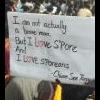Search the Community
Showing results for tags 'ambassador'.
-
http://www.channelnewsasia.com/news/singapore/bilahari-kausikan-on-the/2235302.html Sent from Channel NewsAsia Android app. SINGAPORE: Prime Minister Lee Hsien Loong has posted on Facebook a speech by Ambassador-at-Large Bilahari Kausikan, which was delivered on Oct 31, when Fitzwilliam College of Cambridge University held a conference on the legacy of the late Mr Lee Kuan Yew. Below is PM Lee's post in full, including the speech by Mr Kausikan: Last Saturday, Fitzwilliam College (my father’s old college) of Cambridge University held a conference on the legacy of Mr Lee Kuan Yew. Ambassador-at-Large Bilahari Kausikan spoke at the event. He recounted his personal experience working with Mr Lee, and made telling points about the external challenges that a small country in Southeast Asia will always face. I found it well worth reading, and hope you will too. - LHL Ambassador-at-Large Bilahari Kausikan spoke at a Conference on the legacy of Lee Kuan Yew and the future of Singapore at Fitzwilliam College, Cambridge, on 31 October 2015. Thank you for inviting me to join you in paying tribute to the memory and legacy of Mr Lee Kuan Yew. My generation of Singapore Foreign Service officers were privileged to have had the opportunity to work with Mr Lee and his comrades: Dr Goh Keng Swee and Mr S Rajaratnam. These three men defined the essentials of our foreign policy. Their ideas were formed by the imperatives of survival in the less than benign environment in which Singapore found itself on 10th August 1965, the morning after what was politely termed ‘Separation’. My colleagues and I learnt our trade from them. We did so in very humble capacities: taking notes at their meetings or seeing to the necessities of their travels, but still privileged to observe them at close quarters and absorb something of their modes of thought and operating style. It was a unique apprenticeship. Then as we assumed more senior positions, we came to understand a little more of their considerations by sitting-in on their policy discussions and even occasionally contributed our mite to their decisions. Some of us had studied international relations as an academic subject before joining the Foreign Service. But after 35 years, I have concluded that any resemblance between what I had studied and what I eventually did for a living was purely coincidental. Our real education in the realities of the diplomacy of a small country only started when our professional lives were touched, however tangentially, by Mr Lee and his comrades. The most valuable thing they imparted to us was a cast of mind. Mr Rajaratnam, our first Foreign Minister, has described his first meeting with the international press as Foreign Minister. It was only a few days after we had independence thrust upon us. Relations with Malaysia were fraught with racial tension; Sukarno’s Indonesia was still fighting an undeclared war against us and to our north in Indochina, the Cold War had turned hot. The newsmen were braying for information on how newly independent Singapore would conduct itself. ‘What’, Mr Rajaratnam told us he asked Mr Lee, ‘shall I tell them?’ ‘Just wear a tie, Raja”, was the answer, ‘you’ll think of something’. Big countries may delude themselves about being always in control of events. Small countries cannot afford such illusions. For small countries, foreign policy is usually a series of not always neat or consistent improvisations to a messy and unpredictable reality. The future can at best be only dimly glimpsed and in any case cares not a whit for your concerns. So you must pragmatically adapt yourself to it. One must of course set goals. But having done so, more often than not the most one can do is keep a distant star in sight as one tacks hither and tither to avoid treacherous reefs or to scoop up opportunities that may drift within reach. Successful navigation requires a clinical – indeed cold-blooded – appreciation of the world as it is and not as you may wish it to be. This is harder than you may think. Diplomacy is an area of human endeavour that is more than usually susceptible to self-deception and wishful thinking. Mr Lee and his comrades were not devoid of idealism. Singapore as it is today would not otherwise exist. They risked their lives to make it so. But idealism must be rooted in a hard-headed understanding of the realities of human nature and power. Without power nothing can be achieved. And even with power not everything desirable will always be feasible. No matter how fervently one may wish that they may be liberated from the surly bonds of earth, pigs are never going to sprout wings and fly. Understanding requires information. Mr Lee had intense intellectual curiosity. He sought information without regard for hierarchy. He was tolerant of alternate views or at any rate, he was tolerant of the young and brash desk officer as I then was who, too green to know that the tiger is dangerous, ventured on occasion to argue with him. The tiger’s roar is fearsome and its fangs are sharp. Mr Lee sometimes tried to intimidate you into agreement. But if you stood your ground with reasoned arguments, he listened even if he did not agree. And I am here to tell the tale. Mr Lee and his comrades were impatient of complexity for complexity’s sake; for the sake of showing off how clever one was. He did not suffer fools. If he sought a view, it was to be taken for granted you had something useful to say and would say it in the fewest possible words. And if you didn’t know, say so. What Mr Lee and his comrades possessed to a greater degree than anyone else I have ever met, was an uncanny ability to zero into the core of even the most complicated problem or situation. They wielded Occam’s razor with great intellectual ruthlessness, slashing through the pious obfuscations which too often shroud international issues. Margaret Thatcher once said of Mr Lee: ‘He was never wrong’. That is of course, not true. Nobody can be always right, particularly in international affairs where most of the time most of the factors are going to be unknown or only partially known and where even the effort to know may change what you are trying to know But Mr Lee and his comrades were never shy about changing their minds. Again this is harder than you may think. Too often vested interests, stubbornness or just plain pride stands in the way. Too many people believe their own propaganda. Mr Lee and his comrades avoided this most common of pitfalls because their laser-like focus was always the national interest of Singapore. And they never confused ideology with interest. Diplomacy is not all about being pleasant or making oneself agreeable. It is about defending and advancing the national interest, preferably by being pleasant and agreeable, but if necessary by any appropriate means. In this respect, having to stand your ground in the face of the tiger’s roar – and in the shadows of diplomatic politesse lurk many wild beasts – was another valuable lesson. This is particularly so in Southeast Asia, where majority Chinese Singapore which organizes itself on the basis of multiracial meritocracy, is something of an anomaly. We live in a region where the Chinese are typically a minority and not a particularly welcome one, and where our neighbours organize themselves on the basis of very different principles. Perhaps Mr Lee’s greatest mistake was, during the period when we were part of Malaysia, to underestimate the lengths to which the Malay leadership in Malaysia would go to defend ‘Ketuanan Melayu’ – Malay dominance. It was not a mistake that he or any of our leaders ever made again. The basic issue in Singapore’s relations with our neighbours is existential: the implicit challenge that by its very existence a Chinese majority Singapore organized on the basis of multiracial meritocracy poses to systems organized on the basis of different and ultimately irreconcilable principles. That we have the temerity to be successful, adds to the offence. None of this means we cannot cooperate with our neighbours: we must, we can and we do. But we must do so from a position of strength. Mr Lee was a lawyer and had a deep belief in the rule of law. Yet as a former Chief of the Malaysian Armed Forces has recounted, Mr Lee told him: “if PAS comes into power … and tries to meddle with the water in Johor Bahru, I’ll move my troops in. I will not wait for the Security Council to solve this little problem.” But Mr Lee also once told an Israeli General who had helped start our armed forces that Singapore had learnt two things from Israel: how to be strong, and how not to use our strength; meaning that it is necessary to get along with neighbours and no country can live in perpetual conflict with its neighbours. But we are different and we must remain different to survive. Small countries have no intrinsic relevance. To small countries, relevance is an artefact created by human endeavour and having been created, must be maintained by human endeavour. To remain relevant we cannot be ordinary. We cannot be just like our neighbours. We have to be extraordinary. Yet being extraordinary does not always endear us to our neighbours. The management of this paradox lies at the heart of our foreign policy and prescribes our most fundamental approaches: maintaining balance in Southeast Asia by facilitating the engagement of all major powers in our region, while fostering regional cooperation through ASEAN and maintaining our edge and keeping our powder dry. Singapore and Southeast Asia in 2015 is obviously not the same as Singapore and Southeast Asia in 1965. But some things do not change: our geopolitical situation and how our neighbours chose to organize themselves. The parameters of choice for small countries are never overly broad. The approach that Mr Lee and his comrades bequeathed to my generation of Foreign Service Officers and which we have tried to impart to our successors, still serves us well. Our environment is still complicated and perilous. The US and China are competing for influence with a greater than usual intensity as they grope towards a new accommodation with each other and the region. Malaysia is on a political trajectory that has heightened racial and religious tensions and may well lead to violence. The haze that regularly envelopes Southeast Asia is a reminder that post-Suharto Indonesia is still an incoherent and rent-seeking polity which has yet to reach a stable political equilibrium. The key challenge is internal: that a new generation of Singaporeans will take the achievements of Mr Lee and his comrades for granted as the natural order of things and be persuaded that we are no longer vulnerable. Some opposition politicians and their fellow travellers among the intelligentsia have tried to do just that. They either do not understand their own country and region or place their ambitions above the national interest. Fortunately, as the results of our recent General Election have demonstrated, the majority of my compatriots do not believe them
- 23 replies
-
- 4
-

-
- ambassador at large
- bilahari
-
(and 5 more)
Tagged with:
-
https://www.youtube.com/watch?v=LyLpmLBgOow Video shows American ambassador in South Korea after being wounded with a blade The US ambassador to South Korea, Mark Lippert, was slashed on his face and arm by a blade-wielding assailant shouting anti-war slogans in an attack in Seoul Thursday, police and television reports said. The United States strongly condemned the "act of violence" which left the ambassador bleeding profusely as he was taken to hospital, and said that President Barack Obama had spoken with him." The President called (Lippert) to tell him that he and his wife Robyn are in his thoughts and prayers, and to wish him the very best for a speedy recovery," said Bernadette Meehan, National Security Council spokeswoman. Witnesses said a man with a blade concealed in his right hand attacked Lippert as he was attending a breakfast function at the Sejong Cultural Institute in central Seoul. Video footage in the immediate aftermath of the attack showed the ambassador being rushed out of the building holding one hand to his bleeding right cheek, and his other hand smeared with blood with an apparent wound to the wrist. Lippert, 42, was bundled into a police car and rushed to hospital, where a US embassy spokesman said he was in a "stable" condition. http://news.yahoo.com/us-ambassador-attacked-seoul-231729097.html
- 32 replies
-
- 4
-

-
- american
- ambassador
-
(and 5 more)
Tagged with:
-
Apparently the Libyans were not happy over an anti-islamic online film and stormed the US embassy, setting it on fire. Very ironic but I don't think this would have happened if Gaddafi was still in power. Obama better act tough otherwise he could lose the elections
-
http://sg.news.yahoo.com/insurance-should-...-tommy-koh.html Insurance should cover every person who seeks coverage, whether or not they suffer from pre-existing medical conditions, chronic diseases or congenital health conditions, said Singapore
-
http://www.herworldplus.com/beauty/updates...rand-ambassador





